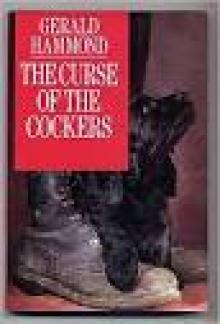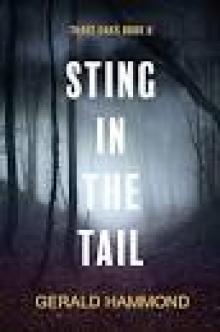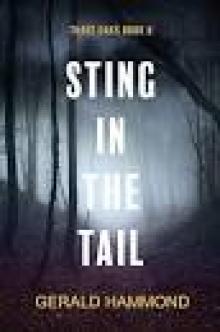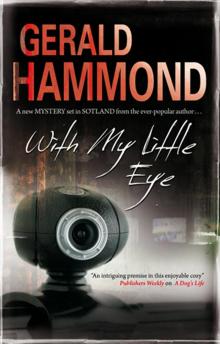- Home
- Gerald Hammond
Twice Bitten
Twice Bitten Read online
TWICE BITTEN
Gerald Hammond
© Gerald Hammond 1998
Gerald Hammond has asserted his rights under the Copyright, Design and Patents Act, 1988, to be identified as the author of this work.
First published in 1998 by Macmillan.
This edition published in 2019 by Endeavour Media Ltd.
Table of Contents
Preface
Chapter One
Chapter Two
Chapter Three
Chapter Four
Chapter Five
Chapter Six
Chapter Seven
Chapter Eight
Chapter Nine
Chapter Ten
Chapter Eleven
Chapter Twelve
I am grateful to Alan Wood of the United Kingdom Blade Association, Mr Wilson of Wilson and Sons (Dundee) Ltd., dog-food manufacturers, and to Keith Erlandson, the gun dog guru, for patiently answering a lot of daft questions.
Preface
It was cold on the hill, and all the colder for what we had just found. The body itself was warmer than we were by far, but it had been roasted as if for some cannibal meal. I had smelled burnt bodies before, in the Falklands and elsewhere, and it was always shocking, not by virtue of what it was and certainly not because the smell itself was bad, but because it smelled like any other roasting meat.
But this was all the worse because I thought that I knew who it was.
The crime had grown from seeds planted years earlier, although I could not have known it at the time. I say ‘the crime’, but in my opinion there were two crimes and the one recognized by the law was the lesser.
Our involvement had begun more than a year before . . .
Chapter One
I remember the night early that spring when Mim was born. The occasion stands out from all the other births which have now rather merged together in my memory, only the latest whelping ever being distinct in my mind. We have had rather a lot of springer spaniel and other litters at Three Oaks Kennels over the years.
Either Daffy or Hannah (our two kennel-maids) would normally attend a whelping. Bitches can usually manage very well on their own and when one of them beats the calendar and fools us she can be counted on to show us a perfect litter with pride next morning. (Puppies, like babies, are nearly always born in the small hours.) So we have never made a rule about it, but the girls are conscientious and involved and they share the duty of attending the accouchement according to a roster of their own devising. If there is any reason to expect a problem, Isobel, a partner and a qualified vet, will keep the sitter-up company or be available ‘on call’. But this was not Hebe’s first litter and no trouble was foreseen.
On this occasion Rex, Daffy’s husband, was away on the oil rig so when Hebe was seen to be moving restlessly and making a nest for herself, Daffy dozed in the armchair in the heated whelping shed. All went well. Daffy even managed a few hours of sleep and had been home for a shower and change. Isobel, who had expressed every confidence in the outcome, was as anxious as anybody and arrived in a rush long before her usual time, just as Beth and I descended the stairs in the old farmhouse and deposited Sam on top of the two cushions on his chair in the big kitchen. Beth and Daffy set about making breakfast. Beth whipped up something special for Sam and, to his indignation, Isobel started spooning it into him. There are no lines of demarcation at Three Oaks Kennels.
‘How did it go?’ Beth asked Daffy.
‘Seven,’ Daffy said. ‘All thriving.’
Isobel picked up immediately on the reserve in Daffy’s voice and flashed her pink-framed spectacles at the younger woman. ‘You don’t sound very sure,’ she said.
‘One of them looks slightly odd.’
That was enough for Isobel. The occasional stillborn pup could be accepted, but oddities might indicate a genetic freak affecting the whole of our carefully sculptured breeding line. She left Sam to feed himself, which he was quite capable of doing with only occasional lapses, and was out of the house like a whippet. She was well into her fifties but if anything was wrong with one of the dogs she could show a remarkable turn of speed. A quick flash of sunshine, a slam of the door and she was gone.
‘Look who’s talking,’ Beth said.
Daffy looked up from the frying pan and put out her tongue. This, bearing in mind that Beth is the third partner, was a piece of impertinence. Daffy also shook her head. I was mildly disappointed to see that although she was still as always an eccentric dresser she had given up wearing a violently coloured stripe in her hair. I had rather enjoyed the daily changing splash of colour. ‘There’s nothing much wrong with her,’ she said plaintively. ‘Or nothing very much. I only said that she looks slightly odd.’
‘She,’ Beth said. ‘Damn!’ Bitch pups, as well as commanding a higher price, were essential to our breeding programme. ‘What else have we got?’
‘Three dogs, three bitches.’
‘What do you mean, “odd”?’ I asked Daffy.
‘Nothing awful. Her ears are black, but the rest of her looks grey rather than black and white. And her face doesn’t look quite right. The bitch couldn’t have been served twice?’
‘No,’ I said. ‘She couldn’t.’
Hannah came in from feeding the other youngsters. Adhering rigidly to the job in hand, she had, with more restraint than the rest of us would have shown, passed by the whelping kennel without looking in on the new litter. Before we had finished explaining, Isobel returned, relief showing clearly on her homely face. ‘Not to panic,’ she said, brooding over Sam again. ‘What we’ve got is a—’
The last word was lost to me in a splutter from the frying pan.
‘A loony?’ Daffy said doubtfully.
‘A Clunie,’ Isobel corrected. ‘That’s what they’re commonly known as.’ She looked round our faces. The two girls were frankly puzzled. Beth put a plate of bacon and eggs in front of me and waited for elucidation. I got on with my breakfast and tried to look as though I knew what Isobel was talking about. Sam made it clear that he could not have cared less and concentrated on the more important subject of breakfast. Isobel, who studies gun dog bloodlines so intensely that she knows them better than the lines on her own face, resumed in tones which might have been used by one explaining the mysteries of the universe to a class of four-year-olds. ‘A throwback to Champion Clunie of Netherbrae. It’s a very strong set of genes and when they come back together, which they do now and again, the result takes after her in both appearance and temperament. I warned you when you chose the sire, you may remember. He has Clunie for a great-great-grandam and Hebe has the same only one generation further back.’
Now that she mentioned it I remembered that Isobel had uttered a few cautionary words, but she had made the risk sound remote and she is inclined to prophesy doom whenever gun dog genetics is under discussion. ‘Surely,’ I said, ‘if Clunie was a champion . . .’
‘She was a very talented bitch,’ Isobel said. ‘Quite brilliant on her day, but temperamental. She was sort of brindled with small spots instead of the larger patches of the usual spaniel, so that she looked grey from a distance. And she had a slightly undershot jaw, just like this pup. Not the kind of appearance to attract an owner. And her temperament was both nervous and headstrong.’
‘And those of her descendants who inherit her looks have her temperament as well?’ I asked, hoping that Isobel might have changed her opinion within the last few minutes.
‘In my experience, invariably.’
‘Oh dear!’ I said mildly. We tried to be very careful of our language now that Sam was not only articulate but approaching school age. He had developed an uncanny knack of singling out the rude word and then picking on the very occasion when we would least like to hear it
repeated. But as the principal trainer in the firm I knew that a headstrong dog which was also of a nervous and sensitive disposition was a trainer’s nightmare. Whatever one did would be wrong for one side or the other of its nature. ‘I’ll take a look as soon as I’ve finished my breakfast,’ I said. ‘In your opinion, what do we do?’
‘You certainly don’t invest time and money training her to work,’ Isobel said. ‘And you can’t sell her as a pup for an owner to train without damaging our reputation for only breeding the best. I don’t see anyone buying her for a pet. We’d better put her down – unless HM Government wants her for a sniffer dog. Clunie had one of the finest noses in the business.’
There was a moment of uncomfortable silence. None of us had the least compunction about putting down the old and sick; each of us, indeed, would have supported the legalization of euthanasia. But we hated to put down any creature only because it was unwanted.
‘Put me down,’ Sam said suddenly. He meant that he wanted to be helped down from the cushion which raised him to a convenient height for feeding.
‘Don’t think we haven’t thought of it,’ Beth said affectionately. She heaved up her first-born and set him on his feet.
‘Please,’ Daffy said, ‘don’t decide just yet. Let’s see what she looks like when her eyes open. If you want a good home for her . . . I might take her. I’ve been wanting one to train on my own account.’
‘My dear girl,’ said Isobel, ‘you don’t know what you’d be taking on.’
‘If she’s going to have the same temperament as Clunie,’ Daffy said stubbornly, ‘and Clunie was made up to Champion—’
‘By the great Harry Stimson,’ Isobel said. ‘One of the greatest trainers ever and while he was at the height of his career. You’d be walking a tightrope between being too harsh and too soft.’
‘I could learn to walk a tightrope,’ Daffy said. ‘Couldn’t I?’ she added in my direction.
Sam was dashing round and round the table, tooting in imitation of an Intercity train. It made rational thinking difficult but I tried very hard. Strictly, the duties of the two kennel-maids were concerned with feeding, cleaning, grooming and exercising our stock and the occupants of the boarding and quarantine kennels. But training followed by success in competition brought in both revenue and reputation. The girls, and Daffy in particular, had been expected to play with and ‘humanize’ the young pups. Daffy had also undertaken much of the elementary training. She had helped me by throwing dummies and firing blank cartridges during more advanced lessons. I had found that she had learned by watching, so that I could tell her to ‘Go and give so-and-so a lesson with the dummy launcher,’ and know that it would be done with skill and sensitivity.
I had never dared to say so aloud, but I had rather hoped that when Isobel, who was the oldest of us three partners, retired from doing most of the handling in field trials, Daffy might be ready to take over. Since the illness which had ended my army career, I had remained subject to occasional fainting attacks that the doctors put down to vagal inhibition, in addition to which I had neither the stamina nor the steadfastness needed for consistent success in competition, both of which qualities Isobel had in plenty and Daffy seemed to be developing. A dog of her own might be the spur to further progress, and the more difficult the dog the further might be the progress. I could see a definite advantage in Daffy learning such lessons from mistakes made on her own dog rather than on one of the firm’s.
‘You’ve been coming on,’ I said cautiously. ‘But you still have a lot to learn.’
‘You can teach me,’ Daffy said. She caught Sam on his next circuit, sat him on her knee and popped a piece of toast into his mouth.
I was about to object to this bland assumption that I would spend my valuable time and energy on training a possible future rival in the field, when Beth chipped in. ‘Let her try,’ she said. ‘We owe Daffy a lot.’
‘I’ve no objection,’ Isobel said, ‘provided, first, that she doesn’t carry our kennel-name and second, that she’s never bred from.’
Probably they were both influenced by the blissful but temporary silence. Daffy, however, seized the moment. ‘That’s agreed, then,’ she said, transferring Sam to Isobel’s knee. ‘Work to be done. Come on, Hannah.’ She headed out of the room before anybody could think of any counter-arguments.
*
The pup was named Mimulus – Mim for short, although there had already been a Mimosa. At eight weeks, she was removed and ownership transferred to Daffy. But we soon began to see a lot of her. Rex, Daffy’s husband, was often to be seen leading the fast-growing pup around on a plaited leather leash, but when Rex was offshore (two weeks out of four) Mim came to Three Oaks with Daffy and mingled with our dogs.
For half a year, all went well. Love and patience seemed to be achieving what conventional wisdom could not. Mim learned to sit, stay, come, lie down and walk reliably at heel. She made progress at retrieving dummies. I was adamant that she must not be introduced to retrieving real game too early – that way lies the mortal sin of running-in – but she learned to retrieve dummies decorated with pheasant wings or rabbit skins by marking, memory, hand signals or scenting.
Sam also was learning. The first and most essential lesson for a child around a kennels was not to provoke a dog into biting him. One sharp nip taught him sense without, I was pleased to see, giving him any real fear. The second was to wash thoroughly after mingling with the dogs and before touching food or his face. Once those two lessons had been ingrained he was free to visit the dogs, admire the young pups or help the girls with the chores. Young children can sometimes develop a better rapport with dogs than their elders. A dog has little reasoning power but a child, even one who would be going to school in a year or so, not being particularly well furnished in that direction, does not expect it. Sam took a particular fancy to Mim. Daffy insisted that without his company as playmate and assistant trainer, Mim would never have made the progress that she did.
One of Mim’s admirers was Quentin Cove. Quentin owned a large farm over to the west of Cupar. He lived alone but he was a sociable man, a back-slapper with a loud laugh and a huge appetite for food and drink and, it was said, despite his bachelor status, women. I got on well enough with him although Beth usually managed to avoid him. Like many Scotsmen of rural upbringing but good education, he was well spoken but inclined to lapse into the Scots tongue when excited.
When the economic climate and the Government between them turned against farming, Quentin had decided to diversify. He was the third generation of Coves to own Ardrossie, so capital was not in short supply. Some lightweight, modern buildings had been erected on a corner of his land and he had set up as a manufacturer and supplier of dog-food. He was adamant that the move arose from no more than sound economics, but I suspected that he had had in mind the interests of his farm-workers who were being displaced by advancing technology. The day-to-day management of the farm was left to his farm manager, Dougal Webb, a graduate from agricultural college but not too proud to drive a tractor or handle a shovel.
We made Quentin’s acquaintance soon after our arrival at Three Oaks. He was newly started in the dog-food business at the time and was acting as his own sales manager. He called to see me, offering an unusual deal which had already been turned down by several of our more established rivals. Although, as a shooting man himself, he kept several dogs, he needed greater feedback than he could manage from his own resources. If we would keep daily records of how our dogs thrived on his products and also allow the use of our competition successes in his advertising, he would supply us with his dog-food at half price, without limit of time.
The offer seemed almost too good to be true. After a trial period, which proved to my and even Isobel’s satisfaction that Quentin’s product was as good as any and better than most, I jumped at it. At the factory the various mixtures were compressed into small and easily crumbled cakes of exact bulk, so that it was easy to count out the proper diet for a dog of any si
ze and energy need. At first, Quentin was also his own delivery driver. Later, as his business grew, he employed others to drive his vans although most often our supplies were brought by Dougal Webb. The dog-food business was, strictly speaking, nothing to do with Dougal, but he was courting Hannah at the time and glad of the excuse to call.
During the summer Quentin, on one of his visits, met Daffy with Mim in the drive. He was very much taken with the spaniel, which was not surprising. Mim was becoming a very charming little dog. She had developed a habit, when Daffy held out her hand at hip level, of rearing up on her hind legs and thrusting her head against the hand, thus obtaining a pat without putting her mistress to any trouble. He enquired as to her pedigree and seemed very knowledgeable about Clunie of Netherbrae, which was not particularly surprising; Quentin’s dogs were cousins to our stock. He told Daffy that if she ever wanted to part with Mim she could expect a good offer. Daffy said that Mim was a champion of the future and advised him not to hold his breath.
Mim’s progress was too good to last.
One morning, at Daffy’s home beyond the village and only a few days after Quentin’s visit, a metal basin which Daffy was taking down from a high shelf slipped from her fingers. The noise, she said later, was just as she imagined a bomb would sound and, by mischance, the basin landed beside the sleeping Mim and caught the spaniel a crack over the nose as it bounced.
The effect on a nervous young dog may be imagined. Poor Mim developed a fear of loud noises which was resistant to normal treatments. In vain we fed her titbits while hands were gently clapped at varying distances. It took only the sound of a carelessly closed door to send her into the shelter of the nearest pair of friendly legs.
Worse was to follow. One week later, Rex was walking with Mim in farmland on the other side of the village. The spaniel seemed to be in better spirits and was quartering the grass, picking up scents and, no doubt, wondering what they might foretell. They reached a crest crowned by gorse bushes. Drawn by the scent of rabbits, Mim pushed into the cover.

 Home to Roost
Home to Roost A Dead Question
A Dead Question Twice Bitten
Twice Bitten The Curse of the Cockers
The Curse of the Cockers In Loving Memory
In Loving Memory Illegal Tender (Three Oaks Book 12)
Illegal Tender (Three Oaks Book 12) Cold Relations (Honey Laird Book 1)
Cold Relations (Honey Laird Book 1) A Brace of Skeet
A Brace of Skeet Silver City Scandal
Silver City Scandal Sauce For the Pigeon
Sauce For the Pigeon Cold Relations
Cold Relations Hook or Crook
Hook or Crook The Curse of the Cockers (Three Oaks Book 5)
The Curse of the Cockers (Three Oaks Book 5) Snatch Crop
Snatch Crop Sting in the Tail (Three Oaks Book 6)
Sting in the Tail (Three Oaks Book 6) A Dead Question (Honey Laird Book 2)
A Dead Question (Honey Laird Book 2) In Loving Memory (Honey Laird Book 3)
In Loving Memory (Honey Laird Book 3) Thin Air
Thin Air Sting in the Tail
Sting in the Tail Pursuit of Arms
Pursuit of Arms The Game
The Game Give a Dog a Name (Three Oaks Book 4)
Give a Dog a Name (Three Oaks Book 4) Fair Game
Fair Game The Executor (Keith Calder Book 10)
The Executor (Keith Calder Book 10) Whose Dog Are You? (Three Oaks Book 2)
Whose Dog Are You? (Three Oaks Book 2) Mad Dogs and Scotsmen (Three Oaks Book 7)
Mad Dogs and Scotsmen (Three Oaks Book 7) Cousin Once Removed
Cousin Once Removed The Worried Widow
The Worried Widow A Shocking Affair
A Shocking Affair Dead Weight (Three Oaks Book 11)
Dead Weight (Three Oaks Book 11) Whose Dog Are You
Whose Dog Are You The Revenge Game
The Revenge Game With My Little Eye
With My Little Eye Doghouse (Three Oaks Book 3)
Doghouse (Three Oaks Book 3) In Camera
In Camera Bloodlines (Three Oaks Book 8)
Bloodlines (Three Oaks Book 8) The Unkindest Cut
The Unkindest Cut